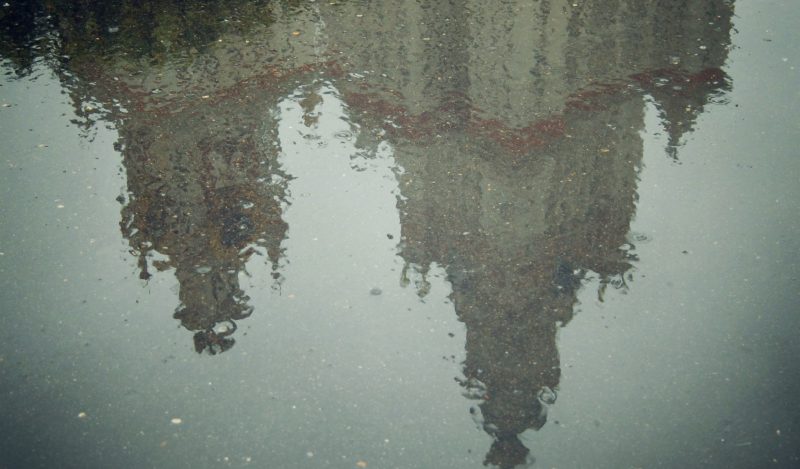[This is the introduction to Conformity Colleges: The Destruction of Intellectual Creativity and Dissent in America’s Universities, by David R. Barnhizer (Skyhorse Publishing, 2024). It takes on new relevance given events at Harvard and what they reveal about who rises and who falls within the ranks of elite academia and why.]
Covid feels like a turning point, a time when universities fully embraced the ideology of control, censorship, and compulsion, represented by universal quarantines, masking, and vaccine compliance, all rooted in symbolism rather than scientific realities. And yet this period might be more correctly seen, as it is in this brilliant book by David Barnhizer, as a codification of deep problems that already existed.
The purge of dissident voices opposed to the progressive/woke religion began many years ago if not earlier. Even from the 1950s, William F. Buckley, Jr. (God and Man at Yale, 1951) observed vast problems at Yale University, which he attributed to the deification of intellectual freedom. Even he could not anticipate that this freedom was only a plea for maximum opportunity for full control.
Freedom is the last thing you will find at elite institutions today. The ESG and DEI bureaucracies are deeply entrenched, and an anti-Western, anti-Enlightenment, anti-reason curricula pervades the whole of the elite establishment. It is reinforced at every level, including publishing, promotion, and tenure demands. Already by 2019, anyone in this realm who identified as a conservative was in the extreme minority.
Covid offered an opportunity to complete the purge. There were fully three rounds of it. It began with quarantines and solitary confinement. One must be willing to impose it, celebrate it, and endure it in order to enter the gates of woke heaven. There was yet another test: once having exited quarantine, one must cover one’s face at all times. For those who passed those two tests, there remained the biggest challenge of all: accept the government’s potion into your arm even though you didn’t need it under the best scenario and it would endanger your life under the worst.
By the end of this ordeal, the final purge of students, faculty, and administrators was complete. Those non-woke voices that remain are too demoralized and afraid to speak up now. The revolution is complete. As a result, the older conception of the university seems almost entirely gone or belonging to only a handful of small liberal arts schools but seemingly absent at the large institutions that once defined what it meant to have an elite educational qualification.
The university experience is something people think they still understand and value. This is a leftover from the past, a romanticized conception that bears little in common with existing realities.
The medieval conception of the university, institutionally flowing from the monastic experience, was that the final truth did exist in a unified whole but it was elusive of comprehensive understanding due to the fallibility of the human mind. The objective of intellectual work was to discover ever more facets of it, elucidate them to students to develop a tradition of thought, and gradually put together systems of thought that point to that truth.
Whatever the discipline – math, music, logic, theology, biology, medicine – they were united in a confidence that if some feature of truth was discerned, it could not and would not live in contradiction to that final and universal truth which was God. This confidence, this mission, underscored an ethos of investigation and teaching. It was to be at once humble and fearless, imaginative but governed by methodological rules, creative but also cumulative. And out of this paradigm was born the idea of science. Every sector of specialization benefited from it.
Based on what we know from the history of ideas, the conception in broad terms survived many centuries in the West until the second half of the 20th, when the whole reason for the existence of the university and even scholarship itself became unmoored from this understanding. With the loss of transcendent concerns, tradition, and even the rules of logic came the evaporation of meaning and then intellectual confidence, eventually replaced by a comprehensive doctrinal ferocity that would have shocked the medieval mind.
These days, it is not even clear why the university exists. Is it vocational training? The rigor of professional certifications seems to cover that in most industries. Is it purely for the sake of gaining knowledge? The Internet makes that available for free. Is it to delay adulthood for as long as possible and socialize students into a more ideal circle of friends and contacts? Maybe but what does that have to do with intellectual life? Or is it merely an institutional sinecure for privileged elites to export unconstrained visions of how a society in which they are not mainstream participants should operate?
We have certainly lived through the decline and fall of the older idea of the university. Now we may yet live to see the end of the university itself and its replacement by something else entirely. Reforms can work but the reform will not likely come from within the institutions. They must be imposed by alumni and perhaps legislatures. Or perhaps the rule of “Go woke, go broke” will eventually force a change. Regardless, the idea of learning itself will surely return. We are in the transition, and David Barnhizer is our Virgil to give us an outstanding tour of the wreckage left behind and perhaps even a path out of the darkness.
Published under a Creative Commons Attribution 4.0 International License
For reprints, please set the canonical link back to the original Brownstone Institute Article and Author.



